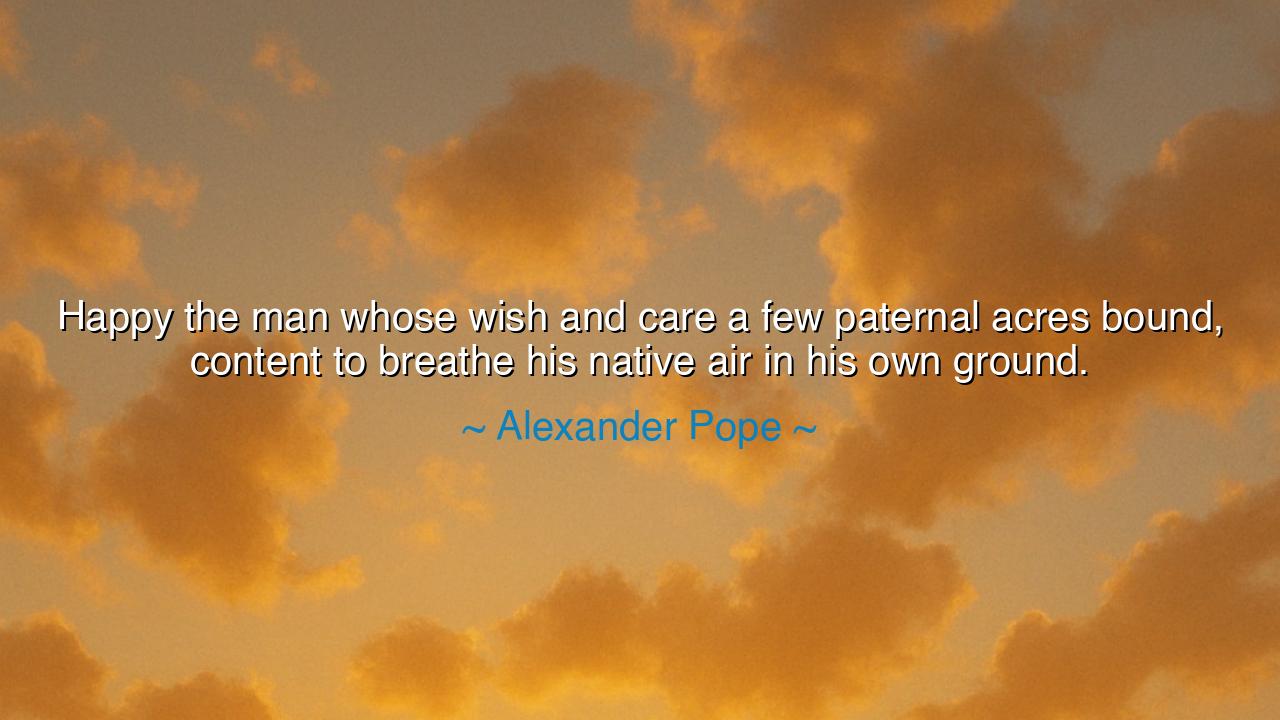
Happy the man whose wish and care a few paternal acres bound
Happy the man whose wish and care a few paternal acres bound, content to breathe his native air in his own ground.






Alexander Pope, the great poet of balance and reason, once wrote: “Happy the man whose wish and care a few paternal acres bound, content to breathe his native air in his own ground.” These words carry the fragrance of the soil and the calm of the countryside. They remind us that true happiness is not always found in riches, nor in fame, nor in the restless chase of ambition, but in contentment—contentment with one’s own ground, with simple labor, with familiar skies. Pope here elevates the humble life, the life anchored in the land of one’s fathers, where roots run deep, and the heart breathes freely.
The origin of this quote lies in Pope’s pastoral reflections on the human condition, for he lived in an age of courts, politics, and glittering ambition. He saw clearly the vanities of men who craved power and wealth, and he contrasted it with the peace of the man who asks for little and treasures much. The “paternal acres” symbolize inheritance—not only of land, but of belonging, of tradition, of the steady rhythm of life passed down through generations. For Pope, the man who dwells content upon his own soil has found a form of wealth that kings may envy but cannot buy.
The ancients spoke in much the same way. Horace, the Roman poet, praised the “beatus ille,” the happy man who tills his own fields, far from the chaos of cities and the corruptions of politics. To him, true freedom was not the ability to command others, but the power to be content with one’s own life. Pope, following this tradition, wove into his verse the old wisdom: that the greatest kingdom may lie within the boundaries of a few quiet acres, and the noblest crown may be peace of soul.
History provides us with luminous examples. George Washington, though he commanded armies and presided as the first president of a nation, longed above all for Mount Vernon, his estate by the Potomac. When his work was done, he returned not to the stage of glory but to the fields of his home. There he found more joy in planting and harvesting, in walking his familiar grounds, than in ruling the councils of power. He lived Pope’s verse: happy was the man content with his own ground, breathing his native air.
The lesson of Pope’s words is not to despise ambition, but to guard against restlessness. Many men pursue what they call greatness, only to find themselves weary, lonely, and empty. The one who embraces contentment—whether in a field, a craft, or a modest home—is richer than the miser with vaults of gold. For happiness does not come from possession without, but from peace within. To breathe one’s native air is to live rooted, not always seeking to escape, but finding joy in what one already has.
Practically, this means cultivating gratitude. Look to what is before you: your home, your family, your daily bread. Do not despise small things, for in them lies great treasure. Plant something with your own hands, even if only a small garden, and let it remind you of the joy of simplicity. Spend time in the native air of your own life—walk familiar paths, sit in silence, breathe deeply of the present moment. There, you will find a contentment that ambition can never bring.
Thus Pope’s words endure as a gentle but powerful teaching: “Happy the man whose wish and care a few paternal acres bound, content to breathe his native air in his own ground.” Let us take them not as a call to withdraw entirely from the world, but as a reminder that the foundation of all joy is peace of spirit, rootedness, and gratitude for the life that is already ours. For the man who finds happiness in his own soil has found a kingdom within his soul, and no storm of the world can take it from him.






AAdministratorAdministrator
Welcome, honored guests. Please leave a comment, we will respond soon